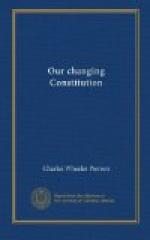The strength of the popular sentiment against any encroachment of federal power was speedily demonstrated in a striking and dramatic way. Under the grant of power to determine controversies “between a state and citizens of another state"[1] the Supreme Court in 1793 proceeded to entertain a suit by one Chisholm, a citizen of South Carolina, against the State of Georgia.[2] It had not been supposed that the grant of power contemplated such a suit against a state without its consent. The decision aroused an indescribable state of popular fury, not only in Georgia but throughout the Union, and led to the adoption of a constitutional amendment[3] prohibiting such suits in future.
[Footnote 1: Art. III, Sec. 2.]
[Footnote 2: See 2 Dallas, 419.]
[Footnote 3: Eleventh Amendment.]
There is a long step between such an attitude toward the Constitution and the viewpoint which finds in it authority for the enactment by Congress of White Slave and Child Labor laws. Obviously there has been a profound change in what the Constitution means to its adherents. It will be interesting to consider briefly what has caused the change of view, and how it has been put into effect.
To one searching for causes the most striking phenomenon is the growth of a national consciousness. At the outset it was practically non-existent. To-day its power has astonished enemy and friend alike. Its growth has been due to both pressure from without and developments within. Our foreign wars, especially the war with Germany, have drawn the people together and enhanced the importance of interests purely national. Some of our other foreign relations have brought into relief the advantages of a strong central government as well as certain inconveniences of our system as it left the hands of the framers. Witness the embarrassment toward Italy growing out of lack of federal jurisdiction in respect of the New Orleans riots, and the ever-present danger to our relations with Japan from acts of the sovereign State of California which the Federal Government is powerless to control. Among developments from within was the Civil War, with its triumph for the idea of national supremacy and an indissoluble union. Another, which has hardly received the attention it deserves, has been the influence of the large element of our population composed of immigrants since the Revolution and their descendants. The state sovereignty doctrine was not a mere political dogma but had its roots in history. It was an expression of the pride of the inhabitants of the Thirteen Colonies in their respective commonwealths. To them it stood for patriotism and traditions. These feelings the later immigrant neither shared nor understood. When he gave up his Old World allegiance and emigrated he came to America, not to New York or Massachusetts. To him the nation was everything, the state merely an administrative subdivision of the nation.




